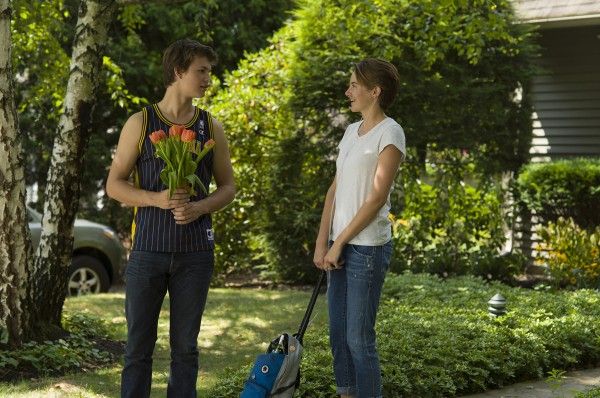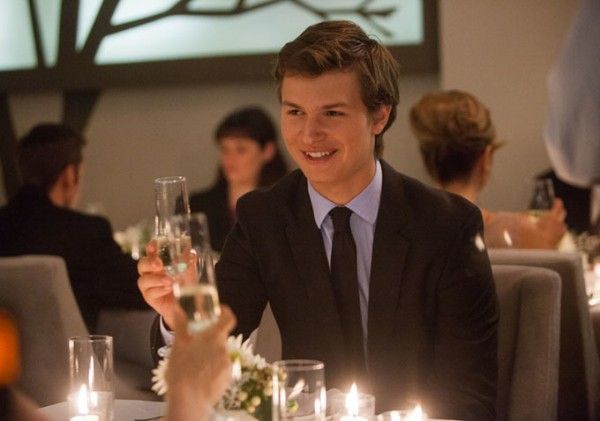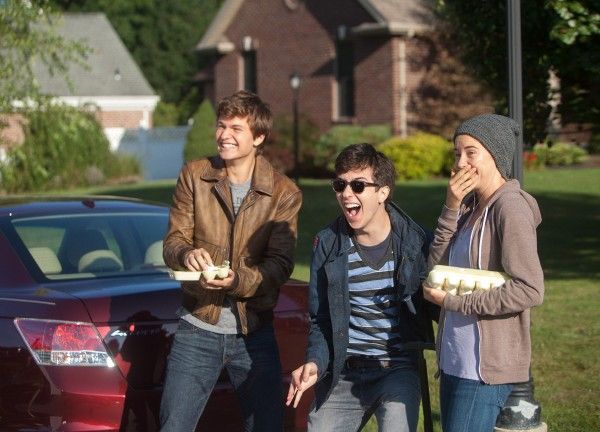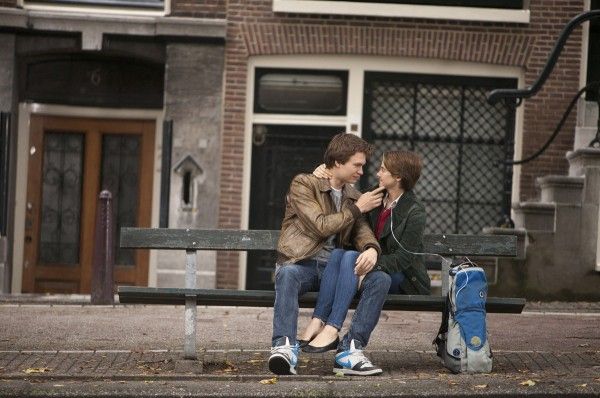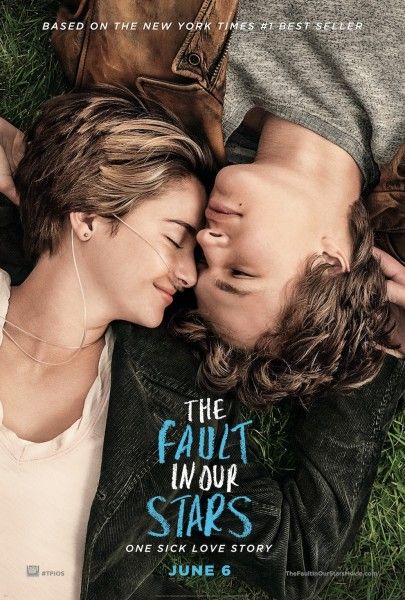Cancer is usually treated as a battle. Words like "fight" and "survive" are used. We use these violent words because cancer causes pain and death. Words like "humor" and "love" rarely enter the conversation unless they're provided in the most mawkish context. These words want to turn a blind eye to suffering and instead dance around in sunshine and rainbows while tumors metastasize and organs fail. Josh Boone's The Fault in Our Stars attempts to embrace the positive by smirking right back at cancer. It turns cancer into a club where only members know how to truly live, and that life on the inside has a unique set of values. Although the movie can sometimes get lost in its fluffy fatalism, The Fault in Our Stars still manages to tug at the heartstrings thanks largely to the mature, charming, shining performances from it lead actors.
Hazel (Shailene Woodley) is a terminal cancer patient who reluctantly attends a cancer survivors' support group. There she meets the incredibly charming, confident, and handsome Augustus "Gus" Waters (Ansel Elgort), whose cancer is in remission after having his leg amputated the year before. He quickly sweeps Hazel off her feet, and the two teenagers bond over understanding the cancer community, the near-brushes with death, and a unique perspective on the absurdity of life. As their romance grows, Hazel must grapple with her feelings for Augustus and her fears about how her death might affect the loved ones she leaves behind.
Boone quickly establishes his film as a rejection of sappy cancer stories by having Hazel's opening narration call out these kinds of movies, and then launch into the reality of life as a young person with cancer. But the real opening salvo comes when we meet the support group's leader, Patrick (Mike Birbiglia), a well-meaning buffoon who tries to put a happy, sing-song tune on having cancer. It's a sign that it's okay to laugh in a movie where young people are slowly dying, and that there is appropriate comedy other than gallows humor.
But The Fault in Our Stars never wants to be cynical, and that's where Gus comes in. Gus is, in some senses, a "Manic Pixie Dream Boy", a dreamboat who can confidently tell a girl he just met that he's using a metaphor when he holds an unlit cigarette between his lips because it doesn't have the power to kill him unless he lights it. It's either one step shy or one step beyond telling someone to marvel at your forced affectation. Gus also always knows the right thing to say, he's rarely vulnerable, and his whole purpose is to get Hazel to come out of her shell and realize the value of life no matter how short it may be.
But dammit, Elgort is too damn charming. In John Green's novel, Gus' charm is met by Hazel's wariness. The book is from her point of view, so her inner resistance counterbalances his outer whimsy. In the movie, Hazel's narration is limited, and so we're given no choice but to completely give into Gus' personality. We have to fall for Gus like Hazel does and Elgort makes it easy. His comic timing is excellent, his smile is so easy, and there's just enough of an "Aw, shucks" attitude to temper the character's precociousness.
He also has a perfect partner in the immensely talented Woodley. It would have been easy for Woodley to lapse into a retread of her character Aimee from The Spectacular Now—shy, sheltered girl who falls for an outgoing, confident guy. But Hazel, although she shares some of Aimee's circumstances, feels like a completely different person. She possesses the knowingness of someone who's had to grow up too fast because her life could be cut short. Her trepidation comes not from being sheltered as much as it comes from a constant reminder of her own mortality, symbolized by the oxygen container she drags around since her lungs are weak. Even though Woodley's 22-years-old, there's no actress better at playing real teenagers.
And yet the movie always feels like it's skipping across the surface. Hazel tries to keep Gus grounded, but he ends up lifting her and us away from the reality that's necessary to keep The Fault in Our Stars from being a sappy melodrama. It's one thing to make audiences cry. Given the right formula, it's actually pretty easy. The hard part is earning those tears, and the movie is always a little too eager to drawn them out.
Hazel's concerned with the people she'll be leave behind when she dies. It's why she's obsessed with finding out what happened to the characters of her favorite book, An Imperial Affliction. But the movie would rather keep an eye on impending death because where there's love and cancer, the grave isn't too far away. Again, it's a formula, and while The Fault in Our Stars can play that formula well, it does so at the expense of emotional complexities. The story is willing to acknowledge the unglamorous parts of a doomed-love story, but never fully embrace them.
Instead, the movie will occasionally get up in the grand gestures at the cost of reality. In one terribly ill-conceived scene, the story attempts to be life-affirming as Hazel and Gus kiss inside the Anne Frank's house. I can understand the rationale behind the scene: Anne Frank died young and so two young people in love shouldn't waste a moment expressing that love. But it's a bit much to do it inside a solemn location like Anne Frank's house. That's about one step away from making out in a Holocaust museum. The scene becomes even more jarring when the other visitors applaud the young couple's public display of affection.
The Fault in Our Stars doesn't want to romanticize cancer, but it does have a tendency to fall in love with romance. When Gus asks Hazel what her story is and she begins to launch into an explanation about her diagnosis, he stops her and says, "Not your 'cancer story'. Your real story." The movie feints at truthfulness even though it occasionally flirts with becoming painfully twee. It wants to paint these two teenagers as real people, but the only real one is Hazel. The other is a dream, but the combination works. One side is grounded and the other uplifting, and while it may not fully embrace the truthfulness Hazel claims at the beginning, it weighs enough to put a lump in our throats.
Rating: B-


